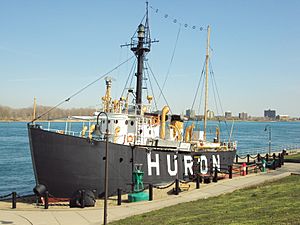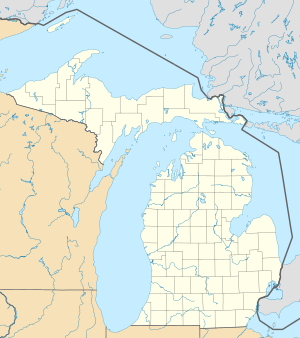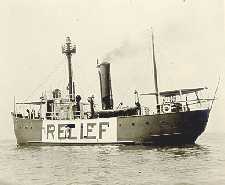United States lightship Huron (LV-103) facts for kids

Huron as she currently appears in Pine Grove Park
|
|
Quick facts for kids History |
|
|---|---|
| Name | LV-103 |
| Builder | Consolidated Shipbuilding Co |
| Laid down | June 5, 1918 |
| Launched | May 1, 1920 |
| In service | December 22, 1920 |
| Out of service | August 25, 1970 |
| Status | Museum Ship |
| General characteristics | |
| Displacement | 312 tons |
| Length | 97 ft (30 m) |
| Beam | 24 ft (7.3 m) |
| Draft | 9 ft 6 in (2.90 m) |
| Propulsion | 175 hp steam engine (original equipment) |
| Speed | 8 knots (15 km/h; 9.2 mph) |
| Crew | 11 |
|
Huron (lightship)
|
|
| Location | Port Huron, Michigan |
| Built | 1918 |
| Architect | Consolidated Shipbuilding Co. |
| NRHP reference No. | 76001974 |
| Significant dates | |
| Added to NRHP | 12 July 1976 |
| Designated NHL | 20 December 1989 |
The United States lightship Huron (LV-103) is a special kind of ship called a lightvessel. It was launched in 1920. Today, it is a museum ship that you can visit. It is docked in Pine Grove Park in Port Huron, St. Clair County, Michigan.
Contents
What is a Lightship?
A lightship is like a floating lighthouse. These ships were anchored in places where it was too deep or difficult to build a regular lighthouse. They helped guide other ships safely, especially at night or in foggy weather.
Huron is one of many lightships that once served on the Great Lakes. These large lakes needed lightships to mark dangerous spots and guide vessels.
Early Lightships on the Great Lakes
The very first lightship on the Great Lakes was the Lois McLain. It was a wooden ship placed at Waugoshance Shoal in 1832. Later, a lighthouse called the Waugoshance Light replaced it in 1851. This area near the Straits of Mackinac in Michigan was very risky for ships.
In Lake Huron, the area called Corsica Shoals was also dangerous. A light station was set up there in 1893. The Huron was the third ship to serve at this important location.
The Huron Lightship Story
Three different vessels were known as the 'Huron Lightship' from 1893 to 1970.
- The first was Lightship No. 61. It was a wooden ship painted red with "Corsica Shoals" written on its sides. It served from 1893 until 1921.
- In November 1913, a huge storm hit the Great Lakes. It destroyed many ships and caused a lot of damage. Lightship No. 61 was torn from its anchors and pushed onto the Canadian shore. Even after this, it was repaired and continued to serve until 1920.
- In 1921, Lightship No. 96 replaced Lightship No. 61. This was the first ship to actually be named Huron Lightship.
By 1925, there were ten lightships on the Great Lakes. But fifteen years later, by 1940, only the Huron remained. It was the last lightship to serve on these lakes.
Building and Serving on Lightship No. 103
The Huron (Lightship Number 103) was built by the Consolidated Shipbuilding Company in Morris Heights, New York. Its construction started in 1918 and finished in 1920. It cost about $147,428 to build.
The ship was 96.5 feet (29.4 m) long and 24 feet (7.3 m) wide. It weighed 312 tons. Originally, it had a steam engine powered by two coal-fired boilers, which produced 175 horsepower (130 kW).
Huron began its service in 1921. It mostly worked in southern Lake Huron near Port Huron. It also spent time lighting other areas like Grays Reef (1924-1926, 1929) and North Manitou Shoal (1934-1935).
In 1935, the ship was painted black and officially named Huron. It was then sent to Corsica Shoals, about 6 miles (9.7 km) north of the Blue Water Bridge.
The Huron had important equipment to do its job:
- An acetylene lens lantern that could be seen for 14 miles (23 km).
- A loud steam whistle fog horn for foggy weather.
- A hand-operated bell.
After 1945, the Huron was the only lightship painted black.
In 1949, the ship was updated. Its steam engine was replaced with two diesel engines. This made the ship faster, reaching a top speed of 9 knots (17 km/h; 10 mph). This upgrade cost $168,000.
On May 7, 1958, a sad event happened. Seaman Robert Gullickson of the U.S. Coast Guard died when a wave swamped a small boat from the Huron. He is remembered on the ship, as he was the only person lost during its many years of service.
The Huron finished its service on August 20, 1970, leaving Corsica Shoal for the last time. It was officially taken out of service in Detroit on August 25. An unmanned warning buoy light replaced it. The City of Port Huron received ownership of the Huron in June 1971.
A Museum Ship and Its Honors
Today, the Huron is a museum ship that people can visit. It has received several important honors:
- It was listed on the National Register of Historic Places on July 12, 1976.
- It became a National Historic Landmark on December 20, 1989.
- It was listed on the State Register on May 17, 1973.
- A State Historical Marker was put up in 1973.
The Huron is very well-preserved. Its original light and fog horn still work! The twin General Motors diesel engines are also fully working, thanks to volunteer mechanics. An Amateur radio station, NM8GS, even operates from the ship. This name is based on the ship's original radio call sign, NMGS.
The engines were damaged while the ship was waiting to be transferred to the state. But local companies and volunteers helped fix the pistons and cylinders. These engines powered everything on the ship, from the lights to the fog horn. To keep them in good shape, they are run every thirty days.
The Huron was the last lightship of its kind. It is also the smallest surviving lightship, representing the 96-foot (29 m) class of these important vessels.
See also
- Lighthouses in the United States
- Lightvessels in the United States
- List of U.S. National Historic Landmark ships, shipwrecks, and shipyards
 | Sharif Bey |
 | Hale Woodruff |
 | Richmond Barthé |
 | Purvis Young |



